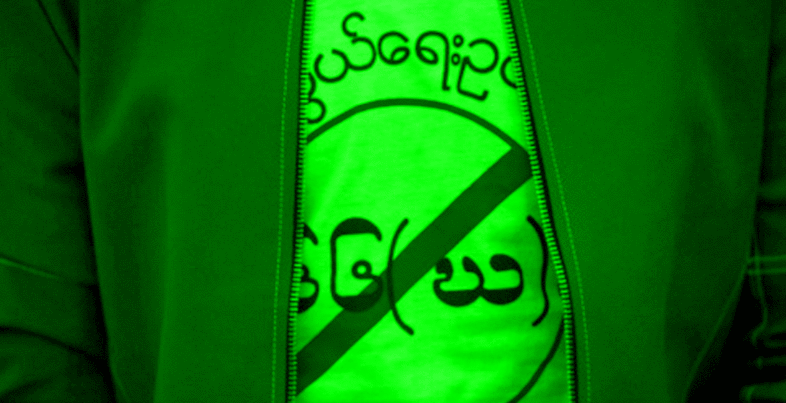Myanmar’s military is undercutting peace efforts with the help of backward laws that the civilian government, which claims to be conducting a peace process, has decided to keep in place.
Anti-war activist Tun Tun Oo was sentenced to three months in prison on Monday after almost a year on trial for using Facebook to live-stream a satirical performance that offended Myanmar’s military. The students who put on the performance were convicted of similar crimes last month, though none was given jail time. Free speech advocates say the case highlights the failure of Myanmar’s laws to protect the public and the military’s disregard for the peace process being conducted by the country’s civilian government.
On Jan. 9, 2017, nine students, including five in university and four in high school, put on a performance titled “We Want No War” during a peace event at in Pathein, Ayeyawady Region. Part of the performance mocked activists who support military incursions into ethnic minority areas.
The following week, Lt.-Col. Aung Myo Khaing, a general staff officer from the Southwestern Command, filed a complaint against the students at the local police station, claiming the performance had “damaged the reputation of the army.” They were charged under Section 500 of Myanmar’s Penal Code, which outlaws non-electronic defamation.
The students insisted that they meant no harm to “either the military or ethnic armed groups” and that they only opposed war. “We don’t like that there are supporters of clashes while clashes have thrown so many into troubled waters,” one defendant told the Irrawaddy at the time.
In May 2017, seven of the nine students were acquitted.
The following month, the military opened a separate case against Tun Tun Oo, who serves as president of the Human Rights Activists Association and is the father of one of the performers. He was charged under Section 66(D) of the Telecommunications Law for live-streaming the students’ performance on Facebook. Section 66(D) nominally prohibits online defamation but is primarily used by military and government officials to punish or silence criticism.
“I streamed it live so that my friends could watch it because my son participated in the drama. I did not intend to defame the military,” Tun Tun Oo explained after the case was brought against him.
Around the same time, Lt.-Col. Aung Myo Khaing appealed his case against the students on behalf of the military, and the court reversed its acquittal. Last month, all nine were convicted under Section 500 and each fined between K30,000 (US$22) and K50,000 (US$37).
On Monday, Tun Tun Oo was handed a three-month jail sentence, which does not include the 11 months he served during the trial period.
“He received a harsher punishment [than the students], I think, because of his profile as president of Human Rights Activists Association, and he is influential in the region,” said Yin Yadanar Thein, a manager for the free speech advocacy group Free Expression Myanmar. “This is a common military tactic to silence bold voices.”
“This says a lot about the military,” she went on. “Civil wars are benefitting the military by allowing them to show off their power and [maintain their political role] in a democratic country. Clearly, the military does not want anyone blaming them or criticizing their wars, so they will do whatever they can in order to protect their power without considering fairness and justice for the people.”
The military’s disregard for the voices of the people affects not only civilians who dare to speak up, but also members of the government with whom the military is meant to be sharing power.
“Ceasefire [with ethnic armed organizations] has been the main priority of the National League for Democracy (NLD). Meanwhile, people who call for an end to the wars are being toughly punished. This obviously contradicts the NLD’s election manifesto,” Yin told Coconuts.
Suppression of anti-war activism should come as no surprise. The military has already demonstrated its disinterest in the peace process by conducting operations in Kachin State and Kayin State that have displaced thousands of civilians over the last few months (not to mention the mass displacement of the Rohingya, who are not included in the peace process).
However, the convictions against the student activists and the jailing of Tun Tun Oo demonstrate the civilian government’s complicity in the military’s bullying. In Sept. 2017, Myanmar’s parliament, dominated by the NLD, acceded to activists demands that Section 66(D) be amended. However, the amendments lawmakers passed in Sept. 2017 did nothing to limit the law’s use as a blunt instrument of censorship.
Yin said: “This case does not fit the definition of defamation under international law because, firstly, the prosecution did not prove that the statements made by the performers and by Tun Tun Oo contained any expressions of fact, and it also could not measure the real harm or damage caused to the military. Secondly, according to international law, the military cannot use the defamation laws to protect its reputation because it is not an individual.”
She added: “The provision needs to be abolished urgently to protect the people’s right to freedom of expression. Additionally, defamation should be an exclusively civil matter, not a criminal one.”



Reader Interactions